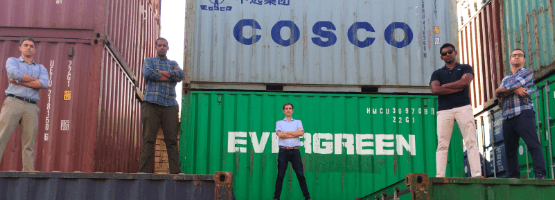Inter-City Transport

World-class supply chains are fast and cheap for shippers, and a fundamental prerequisite for broader economic development. It will take the participation and involvement of both the public and private sectors to build them in East Africa.
Opportunities for Private Sector Involvement
Our team has identified four major opportunities for private sector involvement in Inter-City Transport.
Opportunity 1: Construction and Operation of Toll Roads (Ethiopia)
Since the implementation of the Growth and Transformation Plan I (GTP I), the Ethiopian government has devoted over 5% of the annual GDP to road investments, doubling the Ethiopian road network to more than 100,000km, with the goal of increasing the network to 220,000km within the next 5 years (GTP II).
Express roads are planned to create a radial network from the capital to the different regions in Ethiopia, as well as to connect the future industrial parks. The first one of these is the 85km-long, six-lane, tolled Addis Ababa-Adama Expressway, opened in 2014 and structured as a concessionary loan. The tolls are collected by the Ethiopian administration through the state-owned ETRE, Ethiopian Toll Roads Enterprise, which then serves the 20-year loan from China EXIM Bank. Construction of additional toll roads (such as the extension of the Addis Ababa-Adama Expressway to Awash and the Modjo-Hawassa Expressway) is also underway.
In this context, there is a major opportunity for private sector involvement in the construction of new toll roads. A Design-Build-Operate-Transfer (DBOT) model approach is recommended, as it would provide the Ethiopian government with access to the up-front capital required for construction and could result in more efficient operations & maintenance (O&M). At the end of the concession period, the express road will return to the Ethiopian Roads Authority which could re-tender the O&M or take it over.
There are also private sector opportunities to operate and maintain existing and new express roads. While the current O&M provider for the Addis Ababa-Adama Expressway is the state-owned ETRE (Ethiopian Toll Roads Enterprise), there are opportunities for private sector support as the network expands. The introduction of competition into the market could also reduce overall O&M costs.
Operation of a network of service areas (e.g. roadside restaurants, petrol stations) is another opportunity. While there is currently one under construction at the Addis Ababa-Adama Expressway, as more express roads are opened across Ethiopia, a sizeable portfolio of service stations will emerge, becoming even more attractive for investors and private operators.
Finally, there is a role for private sector expertise in the management of electronic toll collection systems. Currently, the tolls are directly paid in cash at the tollbooths; however, there are plans to transition to an electronic system that could be provided and operated by a private IT services company. This will help speed up the toll collection process (as most vehicles won’t have to stop at the tollbooths) as well as improve the toll collectability.
Opportunity 2: Rail Operations and Infrastructure (Ethiopia)
In Ethiopia, there is the opportunity to use private finance to expand the rail network. The new rail link connects Addis Ababa to Djibouti, and although this has the potential to displace 450 trucks per day from the existing highway (about 30% of the cargo being carried by roads), the existing network will not provide connectivity to Ethiopia’s emerging industrial parks. Several possibilities may exist to capitalize and also generate returns on rail projects that provide this connectivity. For example, a private operator could arrange a build-operate-transfer agreement with the government, or firms in the industrial parks could join forces to fund rail infrastructure if it reduces their trucking costs.
There are also operational opportunities using the existing infrastructure. The existing rail link will not be run at full capacity initially, with only 32 locomotives in service. The private sector could work with the public sector by providing and operating additional locomotives on the existing rail infrastructure.
Opportunity 3: Port Operations and Infrastructure (Tanzania)
As the demand for port capacity increases over time, there will be multiple opportunities for the private sector to help increase efficiency:
In the short-term, additional private sector involvement in port operation (similar to TICTS’ current role at the port) could improve port operations.
In the medium-term, private sector could support the expansion of the existing port in Dar es Salaam through design, construction, financing and operation.
In the longer-term, there are opportunities to construct a new greenfield port in a different part of Tanzania (such as Bagamoyo), free of existing spatial constraints in Dar es Salaam. Private sector could take a major role in constructing and owning a new port which would provide stable ongoing revenue streams through port operations.
Opportunity 4: Liberalization of the Inland Clearance Depots (Tanzania)
Two factors are currently preventing ICDs from fulfilling their potential to increase port efficiency:
1. State-mandated pricing structure
The ICD pricing structure is mandated by the Surface and Marine Transport Regulatory Authority (SUMATRA). ICDs cannot freely set prices. Furthermore, the current pricing structure is such that ICDs can only start charging their customers (logistic agencies) storage fees after the state-mandated grace period of 7 days for domestic cargo and 14 days for transit cargo; if a customer picks up her container before the grace period, the ICD does not earn any revenue on that container. This in turn means, that ICDs can only make a profit when delays in the logistics chain occur. Thus, ICDs are currently mis-incentivized and misaligned with their customers.
2. State-regulated container allocation
Since October 2016, SUMATRA has determined the allocation of containers to the ICDs. Prior to this, shipping lines were able to form contracts with ICDs and have the containers shipped to specific ICDs. Anecdotally, we were told that the allocation process is oftentimes ‘nebulous’ and drastically reduces the planning dependability for ICD owners.
The state-mandated pricing system coupled with state-regulated container allocation prevents competition among ICDs to emerge – and suppresses the incentive for ICDs to differentiate either as a cost-leader or through superior service.
Liberalization of the ICDs would help address these issues. If the TRA granted multi-year licenses to ICD operators, it would increase planning dependability and foster CAPEX investments. Furthermore, ICDs should be able to freely set prices and form contracts with shipping lines to generate their own demand. We predict that this will lead to a change in the pricing structure, where ICDs might start to switch to a ‘ready for pick up’ model – where they start charging the customer a flat fee once the container has cleared customs within the ICDs and is ready for the pick up (and additional storage/penalty fees). Setting their own prices and being able to form contracts with shipping lines would also incentivize ICDs to provide better service (such as better tracking of containers, provision of real-time information, faster turnaround times etc.). Liberalization would help to more strongly align the ICDs economic interest with its customers’ and increase the efficiency of the Dar Es Salaam port logistics.
Key steps for private investors and operators to make these ideas into reality
Private investors and operators who endeavor to make viable infrastructure investments in both Ethiopia and Tanzania will need to take several steps in order for our proposals to become reality in these emerging markets. While the specific steps needed in each country are different, the broad categories of action are similar across geographies. First, investors and operators will need to understand the current business and political context on the ground. By understanding political motives and who is benefiting under the current system they can take the next step which is to partner with domestic businesses where possible and lobby the government to make significant changes to the rules and policies which currently govern the movement of goods throughout these nations. Finally, investors will need to bring strong project specific knowledge in addition to capital acquired at advantageous costs (relative to what is available to governments and domestic businesses).
Ethiopia
Compared to more free-market economies, the authoritarian and Marxist history of government in Ethiopia makes the political apparatus simultaneously more open to infrastructure projects as they have large and direct impacts on the public good, while being somewhat hostile to private profits (particularly foreign ones). We have observed that the weight of this tension skews toward the public good with many foreign investments already at work upgrading the infrastructure. However most of these partnerships are derived from lending to Ethiopia with very specific strings attached to the money and as such are government-to-government transactions. Private capital can be put to work in Ethiopia only if it comes with a plan to return ownership and operations to the Ethiopian people. Thus, any private public partnership must be viable over a limited time horizon, include transfer of critical skills and knowledge to the Ethiopian people, and employ at least some Ethiopians during the partnership period. Those who endeavor to invest in Ethiopia must first take steps to create a business plan that is viable given the above conditions, but then they will find the country receptive to their involvement.
It is also a context where things can change quickly – for example, in January 2017 the government announced that it would offer stakes of state-owned enterprises (including Ethiopian Shipping Lines) with the objective of modernization.
Tanzania
Tanzania lacks a legacy of communism, and the government is more open to private profits than in Ethiopia. Eliminating systemic inefficiencies through public private partnership has immense potential to enrich the country as a whole, but individuals and perhaps entire businesses that benefit from the current system will be adversely impacted and may be inclined to use the access and authority that allowed them to profit in the first place to attempt to impede progress.
Governmental reform will be necessary to incentivize free and fair competition. In the meantime, foreign investors should identify well-established local businesses with whom they can partner.



